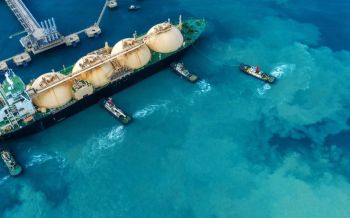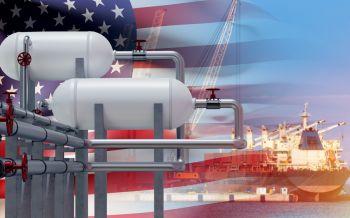- Qatar, Saudi Arabia’s finance chiefs on LNG, project spending
- Franklin Templeton CEO Jenny Johnson provides a view on oil price
The boss of USD 63 billion American hedge fund Citadel took a moment on stage at the Qatar Economic Forum to criticise his country’s pause on permit approvals for LNG facilities.
In an interview at the event, which kicked off on 14 May, Ken Griffin described the Biden administration’s recent policy push – featuring large tariffs on Chinese EVs and the LNG pause – as “yet another part of the incoherent buying economic strategy”.
Griffin said: “The other part of the strategy that I scratched my head about is the US refusing to provide new LNG permits, right?”
In January, the US administration temporarily halted pending and new approvals for LNG export projects, as it stepped up efforts to investigate the implications for the environment and costs for consumers.
The current criteria are roughly five years old, the White House said at the time, “and no longer adequately account for considerations like potential energy cost increases for American consumers and manufacturers beyond current authorisations or the latest assessment of the impact of greenhouse gas emissions”.
READ EU, UK politicians urge Biden to reconsider LNG pause
The move baffled the industry as LNG was lauded at COP 28 as the go-to plugin due to lower emissions than other fossil fuels.
“If you want the world to head towards a lower carbon footprint and move away from coal access to LNG is a really important part of the equation, and yet the United States is refusing to permit new facilities in the foreseeable future,” Griffin added.
Franklin Templeton Investments
Elsewhere at the Doha forum, which attracted leaders from more than 50 countries, Jenny Johnson, the president of US asset manager Franklin Templeton Investments – a top 20 global investment firm with around USD 1.5 trillion in funds under management – provided comment on what deglobalisation could look like in the region and what that would mean for oil pricing, amid the war in Europe.
“As oil stays high – and it doesn’t look like there’s any quick resolution to Russia and Ukraine so it’s likely to stay high – there’s a mentality of multiple generations, which is something I very much appreciate, and a desire to diversify an economy, and the various economies, and so you find investment opportunities,” Johnson said.
Other factors impacting the price of oil include the conflict in Gaza. A report from Bloomberg Intelligence and Bloomberg Economics projected a price rising to ~USD 150 a barrel if direct war ensued between Israel and Iran following the current tension in the region.
Qatar, Saudi Arabia’s finance chiefs on LNG, project spending
Finance chiefs in the region also had a turn on a panel discussion which unpacked their views around sustainable growth among Gulf Cooperation Council countries that rely on their oil and gas exports.
Qatar’s finance minister Ali bin Ahmed Al-Kuwari highlighted the plans around energy, to aid Qatar’s building out of key sectors in manufacturing, logistics, ICT and tourism, following the 2022 World Cup which helped Qatar accelerate its infrastructure development.
Qatar has a target to “grow the non-hydrocarbons by 4% a year” he said, for the next six years until 2030.
While Al-Kuwari noted the energy sector is set to do well, in light of planned LNG expansion which would see Qatar produce 142 mtpa by 2030 in a phased plan, he said this could pose other challenges.
"We are going to be reaching 142 million tonnes per annum... going to make that difficult for us to diversify the economy,” he said.
The Doha-based firm said on 25 February it would kick off the plans for its North Field West project “before the end of this decade”, adding 16 mtpa of capacity on top of what has previously been announced through a new export project at Ras Laffan.
Saad Sherida Al-Kaabi, Qatar’s energy minister and the CEO of QatarEnergy, said extensive appraisal drilling and testing had confirmed that productive layers of Qatar’s giant North Field extend towards the west, which allows for developing a new LNG production project in Ras Laffan. Additional gas quantities in the North Field are estimated at 240 Tcf, he said, noting this raises Qatar’s gas reserves from 1,760 to more than 2,000 Tcf.
Qatar previously planned to expand liquefaction capacity from 77 mtpa to 126 mtpa by 2027-28.
Al-Kuwari said Qatar believes “LNG will be a transit energy for a long time. And this is going to help us to bring in the fund that’s going to be invested in our Vision 2030 and also in our future generation fund”.
Saudi Arabia’s finance minister Mohammed Aljadaan told the same panel that the GCC state is being careful amid high inflation and borrowing costs, as part of an effort to also switch out its reliance on oil for revenue.
Saudi projects, including the likes of Neom, are estimated to collectively run into hundreds of billions but recent reports suggest a potential scale back.
When asked about whether Saudi would deliver on projects if the oil price drops, Aljadaan said he was “quite comfortable”.
“We have been actually very conservative in our assumptions when it comes to our oil revenues,” Aljadaan said, adding that the GCC state had also diversified its revenue alongside conservative oil projections and plans.
READ Strait of Hormuz in focus after Iran's attack on Israel
Considering the recent collective shocks of supply chain disruptions, the war in the Middle East, Red Sea disruptions and even Covid, Saudi Arabia is looking to reprioritise its plans, Aljadaan said. But funding is not actually the constraint, he added.
"It's actually the economic leakage, because if you spend under the current circumstances of serious inflation pressures around the world and serious increasing cost of funding, you are just going to cause two things: one, more inflation and overheating your economy.
“But second, which is also as important, possibly the most important is leakage... If you don't allow your economy to catch up with your projects, you will import a lot more and you will not allow your economy or private sector to catch up and build their factories, manufacturing facilities, and service providers to actually support the projects that you are building.” - PS
Subscription Benefits
Our three titles – LNG Business Review, Gas Matters and Gas Matters Today – tackle the biggest questions on global developments and major industry trends through a mixture of news, profiles and analysis.
LNG Business Review
LNG Business Review seeks to discover new truths about today’s LNG industry. It strives to widen market players’ scope of reference by actively engaging with events, offering new perspectives while challenging existing ones, and never shying away from being a platform for debate.
Gas Matters
Gas Matters digs deep into the stories of today, keeping the challenges of tomorrow in its sights. Weekly features and interviews, informed by unrivalled in-house expertise, offer a fresh perspective on events as well as thoughtful, intelligent analysis that dares to challenge the status quo.
Gas Matters Today
Gas Matters Today cuts through the bluster of online news and views to offer trustworthy, informed perspectives on major events shaping the gas and LNG industries. This daily news service provides unparalleled insight by drawing on the collective knowledge of in-house reporters, specialist contributors and extensive archive to go beyond the headlines, making it essential reading for gas industry professionals.





